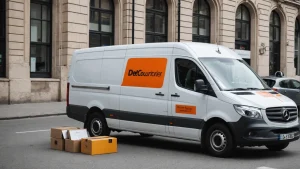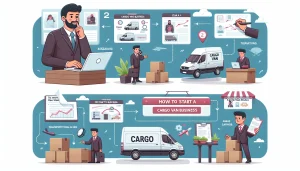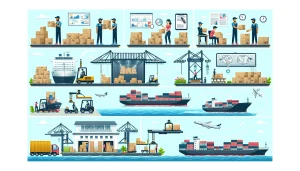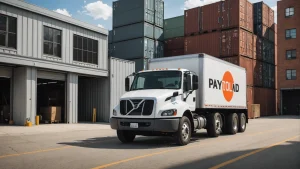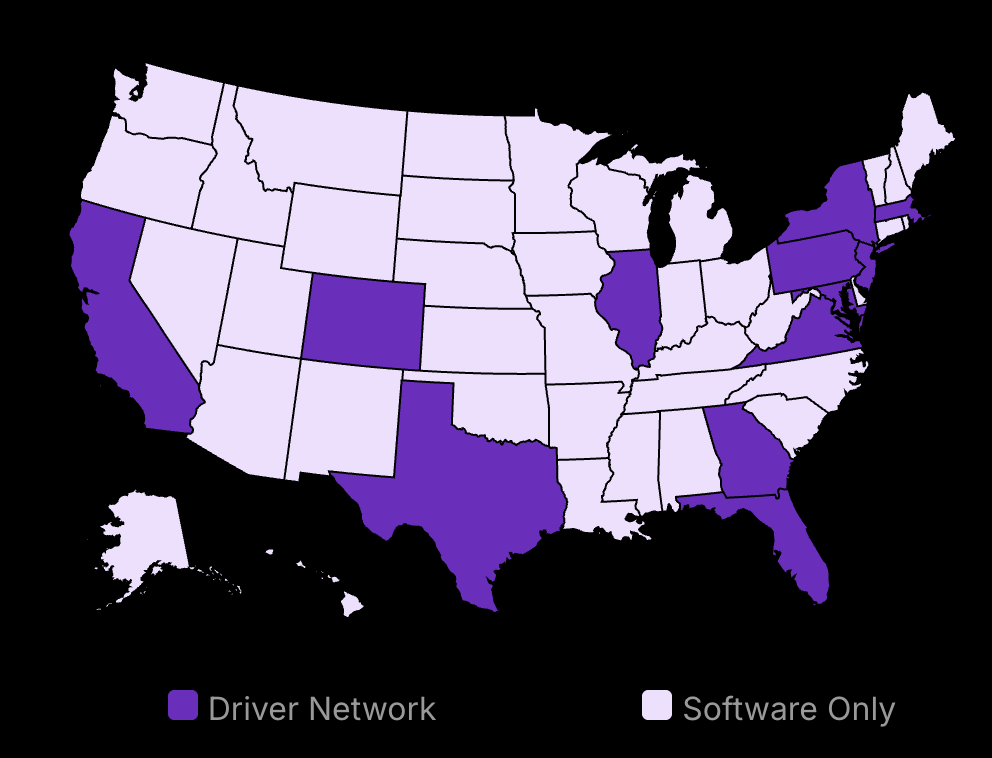Leaping to start a cargo van drivers business?
Then let’s get you ahead of the competition with insider info that rarely sees the light of day. From securing profitable contracts to stepping over common hurdles, this guide will break down the nitty-gritty of how to start a cargo van business. Eager to kick off your own cargo delivery venture? Discover comprehensive strategies on initiating your courier company, from acquiring the right vans to navigating the market challenges.
Now is the time for van entrepreneurs - the global market for courier and delivery services is projected to reach a whopping $343.4 billion by 2025. That's equivalent to the annual GDP of Pakistan, the world's 23rd largest economy.
Get your engines ready; your road to a successful cargo van venture starts here. As you set your sights on establishing your cargo van business, consider tapping into established services like a Baltimore courier service that can offer valuable insights and partnerships to help you navigate the market more effectively.

Earn $1,200+/week delivering for local businesses
Driver benefits:
- Steady local business routes
- Weekly pay + tips
- Dedicated support team
- Flexible scheduling
Step-by-Step Guide: How to Start a Cargo Van Business
Step 1: Creating a Solid Cargo Van Business Plan
A meticulous business plan acts as your north star; it outlines the trajectory of your business and illuminates potential obstacles. Without one, charting a successful path forward becomes a guessing game. Your cargo van business plan is a vital instrument in your entrepreneurial toolbox. It guides your decisions and strategies. Learn how to build a thriving cargo van venture and outpace competitors in the logistics industry.
Thriving Cargo Van Delivery Market 🚚
In 2022, the cargo van market was valued at USD 104.9 billion, soaring to an estimated USD 217.9 billion by 2032, with a projected CAGR of over 8% during the forecast period.
Importance of a Business Plan
The business plan is not simply a box to tick off your launch checklist. It represents an opportunity to investigate your market, analyze competitors, and meticulously calculate your finances and high demand. Your plan informs potential investors and potential customers about fleet sizes, niche markets, and profit projections – all of which collaborate to form a compelling investment argument. Looking for the top courier position that combines independence with lucrative earnings? Learn the essential tactics to secure a prime courier role that fulfills all your criteria.
Key Elements to Include in Your Cargo Van Business Plan
A robust cargo van business plan is multifaceted. It integrates comprehensible market analysis, realistic financial forecasts, an alluring marketing plan, and pricing strategy. Also, you’ll need a compelling executive summary and an extensive operations segment – both should explicitly demonstrate your comprehension of the sector.
Tips for Crafting a Compelling Business Plan
Spin a compelling narrative with your business plan. Make sure it articulates your brand’s values, mission, and vision. Use data to impress potential investors, and leave no stone unturned regarding predicted expenses, revenue, and future expansion plans.
Step 2: Securing the Necessary Capital
After crafting a convincing plan, it’s time for financial mobilization. This phase primarily involves costing your startup and exploring viable funding or passive income options. One key consideration for your cargo van delivery can be finding a reliable partner. For instance, exploring a dedicated courier service in Denver can streamline your operations and enhance service efficiency.
Estimating Startup Costs
Untangle the web of expenses that your cargo business will face in the initial stages. This includes the cost of the cargo van, office setup, membership or association fees, insurance, and, not least, operational costs such as fuel, maintenance, and staffing.
Exploring Financing Options
There are numerous options to amass the funds you need for your enterprise. From small business loans and angel investors to bootstrapping and crowdfunding, the options are diverse. Select the one that harmonizes with your own business, model, and offers the best terms for your circumstances. Seeking the top courier platforms? Evaluate 20 of the leading courier platforms to discover the ideal one for your business needs.
Lucrative Cargo Van Delivery Profits 💰
Cargo van delivery business owners in the US can expect an average profit margin ranging from 10% to 20%, translating to an annual income ranging between $30,000 to $100,000, depending on various factors.
Step 3: Purchasing Your Cargo Van
You’re ready to complete one of the most significant steps – acquiring your cargo van.
Factors to Consider When Buying a Cargo Van
Key aspects to keep in mind when purchasing your cargo van include the vehicle’s capacity, fuel efficiency, reliability, and the cost of maintenance and repairs over time. Considering starting your own courier service? Discover essential insights on beginning a courier enterprise, including selecting the right cargo van, by exploring our comprehensive guide.
Commercial Dominance in Cargo Van Utilization 📦
The commercial segment holds a significant industry share, comprising over 55% in 2022, primarily driven by the escalating demand for last-mile delivery services and the surge in online shopping.
New vs. Used Cargo Vans
Both new and used vans have their own unique sets of benefits and drawbacks. New vans provide warranties, fewer mechanical issues, and newer technology. However, used cargo vans, albeit with possibly more maintenance costs, might provide budget flexibility. Weigh your options and make the choice that checks off the boxes on your business needs checklist.
This step-wise guide equips you with the groundwork to lay a strong foundation for your cargo van business. It empowers you to build a well-informed, strategically effective, and sustainable enterprise.
Navigating the Legal Landscape of a Cargo Van Business
Understanding Licensing and Permit Requirements
Owning and operating a cargo van business requires specific permits and licenses whether it is for moving services or towing services. These not only make your business legal but also open avenues to get your business certified, enhancing your market reputation and competitive edge.
Types of licenses and permits needed
The range of licenses and permits required for a cargo van business includes a business license, commercial driver’s license, licenses, DOT numbers, MC Numbers, and commercial auto insurance. These licenses differ from state to state and depending on the cargo you plan to transport.
The process of obtaining these licenses and permits
Obtaining the necessary licenses and permits goes beyond merely submitting forms. It requires compliance with specific industry rules and standards, which can vary based on local regulations and the business’s scope not to miss many lucrative business opportunities.
Getting Insured
Business van insurance is essential for any vehicle used commercially, typically covering liability insurance to protect against property damage or bodily injury caused by your cargo van, physical damage coverage for theft, fire, vandalism, and other damages, and medical payments for you and your passengers in the event of an accident while driving the cargo van for business purposes.
Importance of insurance in a cargo van business
Without the right and adequate insurance coverage, a single unfortunate incident could lead to financial ruin. Insurance protects the business’s vital resources – the cargo van, the driver, and the cargo itself from damages arising from accidents, theft, and fire among others. As you navigate through the intricacies of your cargo van business, consider how partnering with a reliable courier service can enhance your operational efficiency. Exploring options like a trusted Los Angeles courier service could provide you with the expertise and support needed to streamline your delivery process and satisfy your clients’ needs.
Types of insurance coverage to consider
Commercial auto insurance, cargo insurance, and liability insurance are some of the insurance policies your cargo van businesses should consider. Of course, the optimal mix of insurance types depends on the cargo van delivery business’s specifics like the type of cargo transported and the size of the operation.
Dealing with the legal aspects of starting a cargo van business may seem overwhelming, but with an understanding of the licensing, permits, and insurance requirements, you are on your way to launching a legally compliant and protected business.
Essential Insurance Costs for Cargo Vans 🛡️
Cargo van insurance costs range between $3,300 and $6,200 per year, with potential savings of up to 80% when opting for per-load insurance, offering flexibility and savings based on the transported load.
Finding Loads and Making Money with Your Cargo Van Business
Continuing your journey into the cargo van business, it’s crucial to understand not only the legal workings but also the tactics to find profitable loads and cultivate money-making strategies such as to deliver food, deliver furniture, or rental opportunities for more money.
Identifying Profitable Niches
Being a jack of all trades is great, but finding your niche—a specialized focus—proves more lucrative. Let’s discuss how to find that golden goose of the cargo transportation business.
Focus on market trends and demands. Local communities might require specific deliveries more often—like an uptick in, say, furniture deliveries. Online sellers might need localized delivery services to enhance their supply chain efficiency.
Moving on to the possibilities. The medical sector is continually bustling—with a van, you can transport medical supplies. Similarly, construction materials are hefty and plentiful, offering a steady business. Specialized equipment—a climate-controlled van—for the transportation of sensitive items like fine art or perishable goods like food or flowers can also result in substantial profits.
Building Relationships with Clients
Strengthening client relationships remains paramount. They’re the lifeblood of your business, after all.
First, we need to understand how important they are. With happy clients on your books, you’ve solid stability. Statistically, retaining existing clients is cheaper than acquiring new ones, and they’re more likely to recommend your services to others. Word-of-mouth remains one of the most potent advertising tools.
Developing a relationship isn’t just about being amicable. It requires a more profound understanding of the client’s needs, pain points, and their expectations. Consistently meeting deadlines, offering competitive pricing, and being communicative are simple yet effective ways to maintain your client relationship. Proactive problem-solving, showing empathy, and personalizing service are less tangible but can have a significant impact.
‘Over-delivering’ is another strategy. Yes, it might seem like more work initially, but the long-term benefit is more significant. By exceeding the client’s expectations, you’re building trust and loyalty, which can lead to more business and recommendations in the future.
Remember, in the ocean of cargo van businesses, your unique selling proposition could be the strength of your client relationships. So, focus on fostering these connections. Make every client feel like they’re your only client and see the impact it has on your bottom line.
Marketing Your Cargo Van Business for Success
Developing a Strong Online Presence
Importance of a Website and Social Media Presence
In today’s digital age, carving out online real estate for your cargo van business is non-negotiable. It’s not just about visibility but also trust. Authentic digital presence echoes the legitimacy of your cargo van business ideas and makes you reachable and accessible to clients.
People search for services online, and your website acts as your 24/7 storefront. It allows you to demonstrate your expertise, consolidate customer testimonials, and list services and pricing at your customers’ convenience.
Meanwhile, social media allows your business to interact directly with your target audience. Platforms like LinkedIn, Facebook, Twitter, and Instagram are key for engagement.
Power of Social Media in Business 📱
Instagram boasts a staggering 90% business follow rate, while YouTube ads can reach up to 2.51 billion users, significantly influencing purchase decisions and fostering brand loyalty.
Tips for Creating Engaging Online Content
Successful online content is a solid mix of information, engagement, and brand personality. For websites, keep the language simple and the layout user-friendly, ensuring all relevant information is easy to find. The words must be easy to understand with no use of technical vocabulary. However, an easy fix is to restructure content using a paraphrasing tool. This will make your words resonate with the target audience. Besides that, Incorporate SEO-friendly keywords to enhance visibility on search engines.
On social media, post regular updates about your business, deliver helpful tips, or share relevant articles. You can also use simple design templates to create visuals that capture your audience’s attention. Remember to interact with comments to build a community around your brand.
Visual content is also crucial. Images, infographics, and videos can keep your audience engaged and relay information in an easily digestible form.
Leveraging Offline Marketing Strategies
Importance of Offline Marketing Strategies
Yes, the world is going digital, but offline marketing is far from extinct. It’s about physical visibility in areas where your local target customers frequent. This can be through tactics such as vehicle branding, networking at local business events, distributing your business brochure templates and flyers, or using a mobile advertisement with vehicles.
Examples of Effective Offline Marketing Strategies
For a cargo van business, vehicle branding can be an excellent marketing approach. It’s a mobile billboard that advertises your services wherever it goes.
Sector-specific tradeshows are also worthy of consideration. By renting a booth, you can interact face-to-face with potential clients and even demonstrate your services in real-time.
Significance of Offline Marketing 📺
Despite the digital shift, offline marketing remains crucial, with 39% of marketers viewing it as vital. Traditional channels like television and billboards still hold sway, with approximately 300,000 billboards in the United States alone.
In addition, consider collaborating with related businesses for mutual referral programs or direct mail campaigns targeting local businesses that could use your services.
Each marketing strategy, offline or online, has its pros and cons. Implementing both, however, can create a holistic approach that covers a broad range of potential clients. A harmonious blend of the two can heighten visibility, increase credibility, and drive a consistent flow of customers to your cargo van business.
Understanding the Profitability of a Cargo Van Business
Revenue Streams in a Cargo Van Business
A bespoke cargo van business can have an income from diverse channels. It’s not merely restricted to providing transportation services. Venturing into new revenue streams will elevate profitability and ensure operational longevity.
Cargo delivery provides a consistent income source for most businesses. However, monetizing the van space for promotions and advertisement on delivery vehicles is also a lucrative opportunity. Businesses, local vendors, and startups are continually seeking affordable advertising platforms. Acting as a mobile billboard, your van could serve their needs while filling your pockets.
Lucrative Revenue Streams in Cargo Van Business 💼
The average annual income of a cargo van delivery business owner in the US can range from $60,000 to $80,000 or higher, driven by profit margins ranging from 10% to 20%.
Different Ways to Make Money in a Cargo Van Business
Additional revenue can be generated through value-added services like white-glove delivery, installing equipment, furniture assembly, and more for an added fee. Considering a delivery service or partnering with local business owners to handle their logistical needs also broadens the horizon of opportunities.
Tips for Maximising Revenue
Customer engagement and retention strategies like loyalty programs, referral codes, and discounts can foster strong customer relationships and repeat business. Another tip to escalate your revenue is to secure long-term contracts with other businesses to maintain a steady cash flow.
Managing Expenses
A cargo van business’s primary expenditures are van maintenance, fuel costs, insurance, marketing, and employee wages. By identifying these factors, you’re better equipped to manage your resources effectively.
Common Expenses in a Cargo Van Business
Maintenance costs for cargo vans can be a significant expense. Routine check-ups and timely repairs are paramount to avoid hefty repair charges. Fuel costs are another substantial expense for this type of business. Regular monitoring of fuel charges can help manage expenses wisely.
Tips for Managing and Reducing Expenses
Optimizing routes can result in lesser fuel consumption, thus trimming down the driving time and wear and tear. Efficient scheduling can facilitate multiple orders in one trip, saving both time and money. Another money-saving tip is to look for package deals or discounts for your business insurance.
Wrapping Your Cargo Van Loads Dreams into Reality
Feasibility research, business ideas, acquiring the right van and insurance, listing services, and crafting a stellar customer service experience – these are your milestones on the road to establishing a thriving cargo van business.
Remember, mastering these core elements will equip you with the framework you need for success in this flourishing industry. So, don’t stop here.
Get out there and start identifying potential markets. Map out your new business, plan, and start seeking that perfect van that will become the cornerstone of your venture. Remember, ensuring top-notch customer relations from the start is a surefire way to bolt ahead of the competition.
Ready to start scouting for your first cargo van? Or maybe you’re figuring out how your services will stand out from the crowd.
Don’t forget, this is where your van business adventure truly begins…shortly. The open road awaits you, don’t leave it waiting too long!




